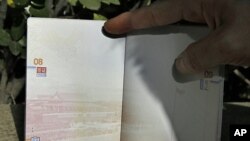The Philippines has become the second Asian nation to refuse to stamp China's new electronic passports, which include a controversial map depicting the South China Sea's disputed waters as Chinese territory.
The Philippine foreign ministry said Wednesday that stamping the Chinese passport could be seen as "legitimizing" what it calls Beijing's "excessive" territorial claim, depicted on the map as a nine-dash line surrounding almost all of the South China Sea. The waters also are claimed in part by the Philippines, Brunei, Malaysia, Taiwan and Vietnam.
Manila said visas for Chinese visitors carrying the new passport will be stamped on a separate piece of paper. It said the move reinforces a formal protest letter sent to Beijing last week.
Vietnamese immigration officials also recently stopped stamping the Chinese passport containing the disputed map, and began issuing visas on separate forms instead.
India has raised a separate objection to the Chinese map, which shows two Indian-controlled Himalayan regions as part of China. In a retaliatory move, Indian authorities have been issuing Chinese visas showing an Indian map of the disputed inland regions.
Chinese foreign ministry spokesman Hong Lei tried to downplay the issue, telling a Wednesday briefing that the Chinese passport map should not be over-interpreted. He said Beijing wants to maintain contacts with neighboring countries to promote what he calls the healthy development of personal exchanges.
Washington has said it will raise concerns with Beijing about the map, which it says has caused "tension and anxiety" in the region.
The Philippine foreign ministry said Wednesday that stamping the Chinese passport could be seen as "legitimizing" what it calls Beijing's "excessive" territorial claim, depicted on the map as a nine-dash line surrounding almost all of the South China Sea. The waters also are claimed in part by the Philippines, Brunei, Malaysia, Taiwan and Vietnam.
Manila said visas for Chinese visitors carrying the new passport will be stamped on a separate piece of paper. It said the move reinforces a formal protest letter sent to Beijing last week.
Vietnamese immigration officials also recently stopped stamping the Chinese passport containing the disputed map, and began issuing visas on separate forms instead.
India has raised a separate objection to the Chinese map, which shows two Indian-controlled Himalayan regions as part of China. In a retaliatory move, Indian authorities have been issuing Chinese visas showing an Indian map of the disputed inland regions.
Chinese foreign ministry spokesman Hong Lei tried to downplay the issue, telling a Wednesday briefing that the Chinese passport map should not be over-interpreted. He said Beijing wants to maintain contacts with neighboring countries to promote what he calls the healthy development of personal exchanges.
Washington has said it will raise concerns with Beijing about the map, which it says has caused "tension and anxiety" in the region.
